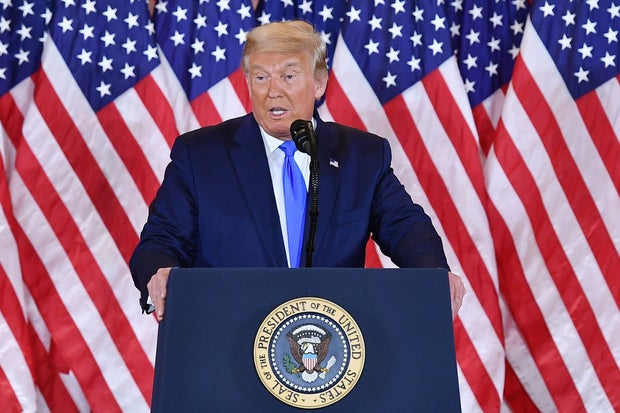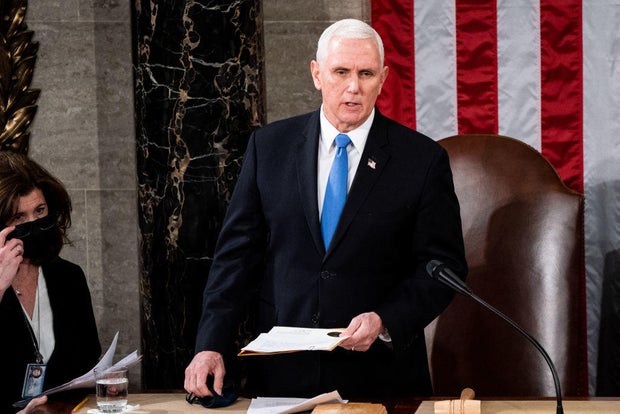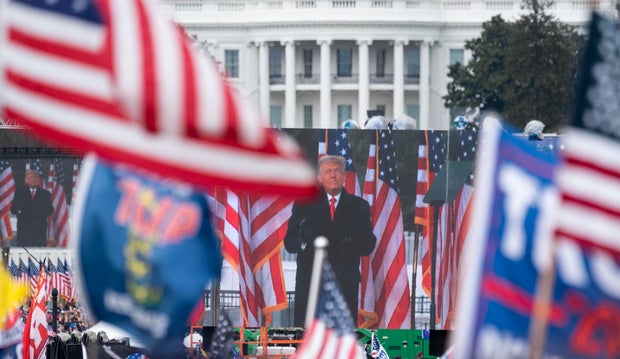Washington — U.S. District Judge Tanya Chutkan has made public a key filing from special counsel Jack Smith that includes evidence compiled in his investigation into former President Donald Trump’s alleged efforts to subvert the transfer of presidential power after the 2020 election.
The highly anticipated 165-page filing provides the most comprehensive look at the evidence federal prosecutors have amassed in their case, which was upended by the Supreme Court’s July decision finding Trump is entitled to some level of immunity from federal charges.
In the new brief, prosecutors argued that Trump’s conduct was private in nature and therefore not covered by immunity. They reiterated the allegations against Trump and revealed new insights into the mountains of evidence they have collected over the course of the case.
The filing described how Trump and his aides allegedly planned to challenge the election results far in advance of Election Day and pressured Vice President Mike Pence to reject Electoral College votes on Jan. 6, 2021. In one striking passage, prosecutors said Trump replied, “So what?” when he was told that Pence could be in danger at the Capitol.
“When the defendant lost the 2020 presidential election, he resorted to crimes to try to stay in office,” Smith and his team wrote.
What the new filing says
The filing from Smith is divided into four parts. The first part lays out the evidence against Trump, including information that was included in the indictment against him. The second section details the legal issues surrounding presidential immunity, followed by a section that “establishes that nothing the Government intends to present to the jury is protected by presidential immunity.” The final portion details what the government is asking the court to do, namely to rule that Trump must stand trial.
Names of alleged co-conspirators, campaign staff and White House officials are redacted in the filing, along with certain references to grand jury proceedings.
The former president was initially charged in August 2023, and the special counsel filed a new, narrower indictment to comply with the Supreme Court’s immunity decision. Trump has pleaded not guilty and denies wrongdoing.
The high court laid out three categories of presidential acts and corresponding levels of immunity. Actions taken within a president’s exclusive constitutional authority are entitled to absolute immunity, official acts are entitled to the presumption of immunity and unofficial acts are not entitled to immunity at all.
Smith’s brief argues that Trump’s scheme to remain in power for a second term “was a private criminal effort,” not one that involved official conduct, and that Trump tried to overturn the election in his capacity as a candidate — not as president.
“The defendant asserts that he is immune from prosecution for his criminal scheme to overturn the 2020 presidential election because, he claims, it entailed official conduct. Not so,” prosecutors wrote. “Although the defendant was the incumbent president during the charged conspiracies, his scheme was a fundamentally private one.”
Steven Cheung, a spokesman for Trump’s campaign, criticized the release of the filing, calling it “falsehood-ridden” and “unconstitutional.”
“This entire case is a partisan, unconstitutional witch hunt that should be dismissed entirely, together with all of the remaining Democrat hoaxes,” he said.
Smith’s office declined to comment.
Prosecutors offered their legal arguments in the filing for why they believe the alleged conduct was personal, not official, in nature and consistently characterized Trump’s alleged actions as those of a candidate and not the president.
“Under the Constitution, the Executive Branch has no constitutionally assigned role in the state-electoral process. To the contrary, the constitutional framework excludes the President from that process to protect against electoral abuses,” the special counsel argued.
Throughout the filing, prosecutors argued Trump was not immune from criminal prosecution because he carried out the alleged conduct as a candidate for office and offered their legal basis for the inclusion of key pieces of evidence — like tweets, speeches and the testimony of White House aides — at trial.
“He’s going to declare victory”
The narrative begins in the weeks before the 2020 presidential election, when prosecutors said Trump was briefed on the likelihood that many Democratic voters would cast their ballots by mail and have their votes counted after Election Day. Investigators alleged Trump told his advisers that he would “simply declare victory before all the ballots were counted and any winner was projected.”
This plan was repeated by an unnamed political adviser, according to Smith, who wrote that the adviser told a private gathering of supporters three days before the election that Trump plans to “just declare victory. Right? He’s going to declare victory. That doesn’t mean he’s the winner, he’s just going to say he’s the winner.”
“Immediately following election day on November 3, the defendant did exactly that,” prosecutors alleged, despite the fact that Trump’s advisers — including Pence — “informed him he would likely lose” and that his claims of voter fraud “were false.”
Prosecutors said that while some of the former president’s top campaign staff were telling him that he lost, he went on to tap his personal attorney, former New York City Mayor Rudy Giuliani, to spread false claims about the integrity of the election. Giuliani’s name is redacted in the filing, but context makes clear whom prosecutors are referring to.
The special counsel cites a conversation between two political operatives in which they discuss Trump firing his deputy campaign manager and putting Giuliani in charge.
The Trump campaign’s legal strategy then allegedly turned to various swing states where they sought to challenge Joe Biden’s victory in Arizona, Georgia and Michigan. According to prosecutors, Trump and his allies allegedly pushed false claims of fraud and tried to use those claims as a basis to appoint an alternate slate of electors that would support the unsubstantiated claims of victory. They also tried to pressure local and state officials into complying with their plans, according to prosecutors.
“As late as January, the conspirators attempted to keep the full nature of the elector plan secret,” the special counsel said. The special counsel wrote that Trump’s “steady stream of disinformation” culminated in his speech outside the White House that preceded the attack on the U.S. Capitol on Jan. 6.
Trump and Pence
Among the key determinations that Chutkan will make is whether Trump can face charges arising from his discussions with Pence, who presided over the joint session of Congress on Jan. 6, when the electoral votes were counted.
Smith wrote that the government plans to introduce evidence regarding phone calls and meetings between Trump and Pence “in which they did not discuss Pence’s official responsibilities as president of the Senate and instead acted in their private capacities as running mates.”
Trump and his allies pressured Pence to unilaterally toss out the electoral votes from key battleground states during the joint session and reverse Mr. Biden’s win, prosecutors allege.
The filing states that Pence “tried to encourage” Trump “as a friend” when news networks projected Mr. Biden as the next president. In other instances, he suggested the former president recognize the “process is over,” and encouraged Trump to run again in 2024.
“The overall context and content of the conversations demonstrate that they were primarily frank exchanges between two candidates on a shared ticket,” prosecutors said.
The filing recounts a conversation Trump had with an unidentified aide on Jan. 6 as a mob of his supporters breached the Capitol, prompting the evacuation of Pence and lawmakers in the building. Trump had posted a message to social media criticizing Pence for refusing to toss out electoral votes. The vice president was evacuated to a secure location soon after.
Prosecutors said that after learning Pence had been forced to leave the Capitol, the aide rushed into the White House’s private dining room to tell Trump “in hopes that [he] would take action to ensure Pence’s safety.” After delivering the news, Trump looked at the aide and said, according to the filing, “So what?”
The Capitol Attack
During his speech on Jan. 6, prosecutors alleged Trump “told his crowd many of the same lies he had been telling for months” and “made clear that he expected his supporters to take action.”
“The defendant directed his supporters to go to the Capitol and suggested he would go with them,” the special counsel said.
As his supporters breached the Capitol, Trump monitored Twitter and Fox News, according to prosecutors, and issued messages targeting Pence. Prosecutors included many of Trump’s tweets about the attack and alleged Trump “refused” requests from many of his advisers “to issue a calming message and make efforts to stop the riot.”
They revealed in the filing that forensic evidence from the former president’s iPhone and observations by witnesses will show that Trump “sat in the dining room by the Oval Office, where he used his phone to review Twitter and watched television,” which was showing coverage of the Capitol attack.
An FBI forensic examiner can testify about the news and social media applications downloaded on Trump’s phone, according to the filing, and can describe how it was being used throughout the afternoon of Jan. 6.
Prosecutors said the activity log on Trump’s phone also shows he was using it — and the Twitter app in particular — consistently throughout the day.
As to what was playing on the television in the dining room, Smith and his team wrote that three unidentified White House staffers can speak to what Trump was watching. Prosecutors plan to introduce “authenticated coverage” showing what was airing on Fox News in real time while Trump was tuned in, they said.
Notably, investigators revealed Trump and his allies — including Giuliani — allegedly attempted to “exploit the violence and chaos at the Capitol” in a bid to delay the election certification further by calling senators and leaving voicemails asking that they object to the states.
Early on the morning of Jan. 7, Pence ultimately presided over the counting of the Electoral College votes, declaring Mr. Biden the winner.
Accompanying the expansive filing Smith submitted to Chutkan last week is an appendix that includes exhibits. That is being kept secret, at least for now. The judge has given Trump and his team until Oct. 10 to provide her with any objections to redactions proposed by Smith.



